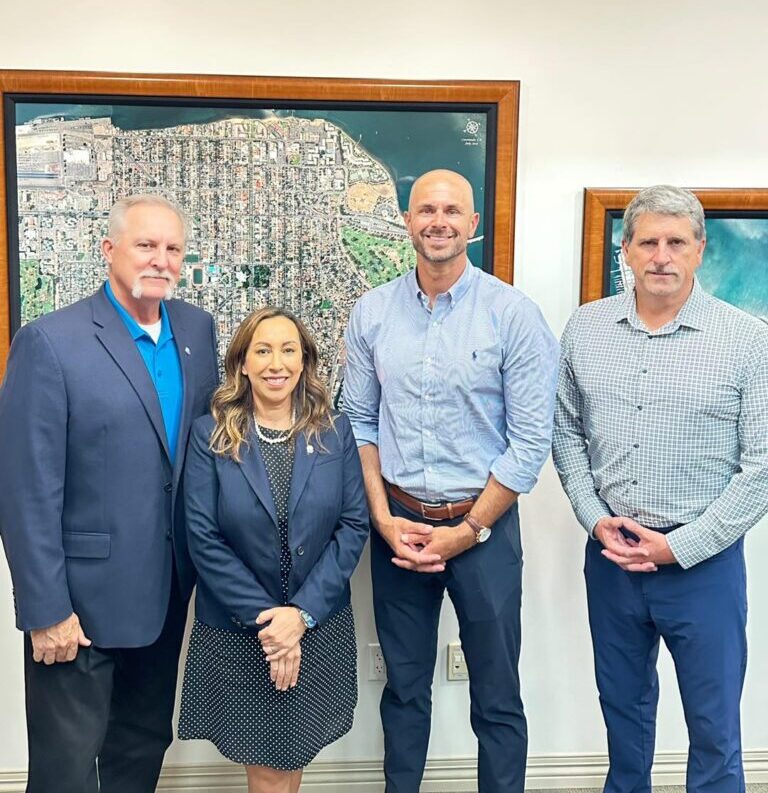Coronado and Imperial Beach are joining forces to better address cross-border sewage from Tijuana, a decades-long problem that is receiving more federal- and state-level attention this year.
Representatives from both cities met Aug. 8 and will continue to do so in the future.
“The purpose of the meeting was to share what we’re doing and try to coordinate our efforts in the future to create the most efficient and effective solutions,” said Coronado City Council Member John Duncan, who sits on the council’s subcommittee on cross-border sewage and said this issue is one of the reasons he ran for office.
“It was an excellent meeting,” Duncan continued. “Both cities learned very valuable things about how we can help each other, and we’re coordinating our future efforts on many fronts.”
An estimated 35 billion gallons of raw sewage per day is poured into the Pacific Ocean from the San Antonio de los Buenos treatment plant in Tijuana, according to Environmental Protection Agency estimates. Additionally, rainfall pushes sewage and trash from Mexico into the Tijuana River, across the border, and to San Diego coastal waters, prompting beach closures and water safety advisories.

Duncan attended the Imperial Beach meeting with Coronado Mayor Richard Bailey, City Manager Tina Friend, and Assistant City Manager Tony Winney. Representatives from Imperial Beach were Mayor Paloma Aguirre, City Council Member Mitch McKay, City Manager Tyler Foltz, and Chief Administrative Officer Erika Cortez-Martinez.
Specifically, Duncan noted that while Imperial Beach has been focused on state-level action, Coronado has focused on federal-level solutions. Combining forces will limit redundancy and provide a more powerful voice. In addition, he said, the two cities can help one another: For example, Coronado has a lobbyist on retainer who can help with Imperial Beach strategies.
Coronado representatives, including Duncan, will also meet with Congressman Scott Peters, who has also been vocal about ending transboundary sewage flow, on Aug. 14 to discuss strategy.
Last August, the US pledged $330 million to the International Boundary and Water Commission for projects mitigating the crumbling infrastructure on both sides of the border, with Mexico pledging another $144 million. At the time, the funding was expected to be about three-quarters of the cost to fully solve the problem, but would mitigate the issue significantly.
However, in an unforeseen blow, officials learned that the South Bay International Wastewater Treatment Plant requires $150 million in deferred maintenance before projects could even begin, sapping almost half of the allocated federal funds. By law, the IBWC cannot accept funding from either government or private parties without Congress passing legislation allowing it, making fundraising challenging.
“It’s been frustrating, because the news keeps getting worse,” Duncan said. “I do believe we’re going to make progress, and we are starting to make progress, but meanwhile, the problem gets worse.”
To that end, the two cities hope to open the way for the IBWC to accept more funding. And, Duncan said, keeping attention, both locally and nationally, on the problem is critical.
Some Coronado residents have rallied around the issue through Stop the Sewage, an advocacy group founded in May pushing for more action and for the county, state, and federal governments to declare states of emergency over the matter. After the group’s first protest in May, the San Diego County Board of Supervisors declared a state of emergency.
The group’s next protest will be Sept. 1 at 4 pm on Central Beach in Coronado.
On Aug. 7, the US and Mexican governments met in Mexico City to reaffirm their commitment to remedial projects for the sewage crisis. The meeting came on the one-year anniversary month of the implementation of Minute 328, in which both countries agreed to the seven wastewater projects, to be completed over five years, with the combined $474 million in funding currently slated for repairs.
“We recognize how important these projects are and the impact they will have on public health and the beaches of our communities along the border,” said María-Elena Giner, he U.S. IBWC Commissioner. “Expanding the international treatment plant as soon as possible is a top priority.”
In Tijuana, the Orientele Collector project has been completed, and materials needed for repairs to the International Collector have been acquired. The US expects to award a contract for the design of the South Bay International Wastewater Treatment Plant by summer of 2024.
“Lots of handshakes on the same day another 35 million gallons of sewage is dumped on our beaches,” said Laura Wilkinson, a founder of Stop the Sewage, of the meeting between the US and Mexico. “We want action. We are done with talk.”
Wilkinson is still pushing for a federal state of emergency, which would allow emergency funds be allocated to solving the problem.
“Until it is fully funded with a shovel in the ground, it is talk,” she said.
To Duncan, while the meeting may not have changed the problem, it served the purpose of keeping the issue present in both politicians’ and community members’ minds.
“So often in the past, a politician would make a statement and then leave,” he said. “The fact that the US government is continuing to meet and watch it and make sure (repairs) happen, that is new to me, and I’m glad it’s happening. I’m hopeful.”




